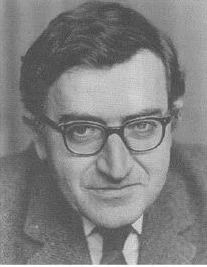Robert Alexander Amiel "Rob" Buckman was a
British-
Canadian doctor of medicine,
comedian and author, and president of the
Humanist Association of Canada. He first appeared in a Cambridge University
Footlights
Revue in 1968, and subsequently presented several television and radio
programmes about medicine, as well as appearing on comedy programmes
such as
Just a Minute. He was also the author of many popular books on medicine.
[1]
(August 22, 1948 – October 9, 2011)
Broadcasting and comedy
Buckman attended
University College School and graduated in medicine from
St. John's College, Cambridge in 1972. He continued his medical training at the
Royal Marsden Hospital and
University College Hospital,
London, becoming a Fellow of the
Royal College of Physicians.
Buckman was a familiar voice on
BBC Radio 4
during the 1970s and 1980s, both on panel shows, and fronting one-off
programmes on scientific topics. He contributed scripts to the sitcom
Doctor on the Go, based on the
Richard Gordon books, and also acted in the
Pink Medicine Show comedy show. He also was one of the performers and writers of the first
Secret Policeman's Ball fundraiser in 1979, with
Billy Connolly,
John Cleese and
Eleanor Bron.
Rob Buckman was more distinguished as a popular science presenter and appeared on the programme
Don't Ask Me in the 1970s, and then the medical programme
Where There's Life with
Miriam Stoppard for its first three series from 1981. He continued this career in Canada where he contributed to
TV Ontario programmes such as
Your Health and the
CTV medical show
Balance as well as frequent guest appearances on
The Dini Petty Show. His television series
Magic or Medicine? investigated
alternative medicine and won a
Gemini award, while
Human Wildlife covered
microbes in the domestic environment.
He was a member of the Atheists team on CBC
Test the Nation: IQ broadcast live on January 24, 2010.
[2]
Writings in popular medicine
Besides tie-ins to his TV series, Buckman authored several books of medical humour, such as
Out of Practice (1978),
Jogging from Memory: or letters to Sigmund Freud (1980), and
The Buckman Treatment; or a doctor's tour in North America (1989). Later, as Robert Buckman, he contributed as author or co-author to a series of
What You Really Need to Know About... books on common medical conditions, including
cancer,
asthma,
high blood pressure,
HRT, (all 1999),
diabetes,
stroke, and
irritable bowel syndrome
(2000). This was also the title of a long-running series of information
films that he presented, and in many cases also scripted, for John
Cleese's production company
Video Arts.
Medical hiatus
In 1979, Buckman was diagnosed with
dermatomyositis, an autoimmune disease which seriously affected his ability to work and was nearly fatal.
[3] His illness and recovery over the next couple of years was the subject of a 1981 UK TV documentary,
Your Own Worst Enemy.
[4]
Later career
Buckman emigrated to
Toronto, Canada, in 1985 and initially stayed with his cousin, journalist
Barbara Amiel.
[5] In 1994 Buckman was named Canada’s Humanist of the Year. He was a signer of
Humanist Manifesto 2000. He was president of the
Humanist Association of Canada, and Chair of the Advisory Board on Bioethics of the
International Humanist and Ethical Union. His main popular work in
humanism was
Can We Be Good Without God? Biology, Behaviour and the Need to Believe.
Buckman practised medical oncology at the
Princess Margaret Hospital (Toronto). He was a Professor in the Department of Medicine at the
University of Toronto, and held an adjunct professorship at the
M.D. Anderson Cancer Center in the U.S. state of Texas. He specialised in
breast cancer and teaching communication skills in oncology.
In 2006 he began writing a weekly column in the
Globe and Mail.
Death
Buckman died in his sleep while flying from London to Toronto on October 9, 2011. The cause is unknown.
[5] He was 63.
Selected publications
- Out of Practice, illustrations by Bill Tidy. Deutsch. 1978.
- Jogging from Memory. Heinemann. 1980.
- Medicine Balls Too. Papermac. 1988.
- I Don't Know What To Say - How To Help and Support Someone Who Is Dying 1988.
- Not dead yet: the unauthorized autobiography of Dr. Robert
Buckman, complete with a map, many photographs & irritating
footnotes. Doublesday. 1990.
- How To Break Bad News: A Guide for Healthcare Professionals. Papermac. 1992.
- Magic or Medicine? An investigation of Healing and Healers (with Karl Sabbagh). Macmillan. 1993.
- Who can ever understand? : talking about your cancer with John Elsegood. 1995.
- What You Really Need to Know About Cancer:A Guide for Patients and their Families. Pan paperback. 1997.
- Robert Buckman. Anne Charlish. ed. What You Really Need to Know About Living With Depression. Lebhar-Friedman Books. 2000.
- Can We Be Good Without God?: Biology, Behavior, and the Need to Believe, Prometheus Books, 2002. ISBN 978-1-57392-974-5
- Human Wildlife: The Life That Lives on Us, Johns Hopkins University Press, 2003. ISBN 978-0-8018-7407-9
- Robert Buckman. With contributions by Dr Pamela Catton and staff of Princess Margaret Hospital. Cancer is a Word, Not a Sentence. Firefly Books. 2006.
To see more of who died in 2011
click here
 Antonis Christeas was a Greek professional basketball player of the 1950s and 1960s era.
Antonis Christeas was a Greek professional basketball player of the 1950s and 1960s era.













